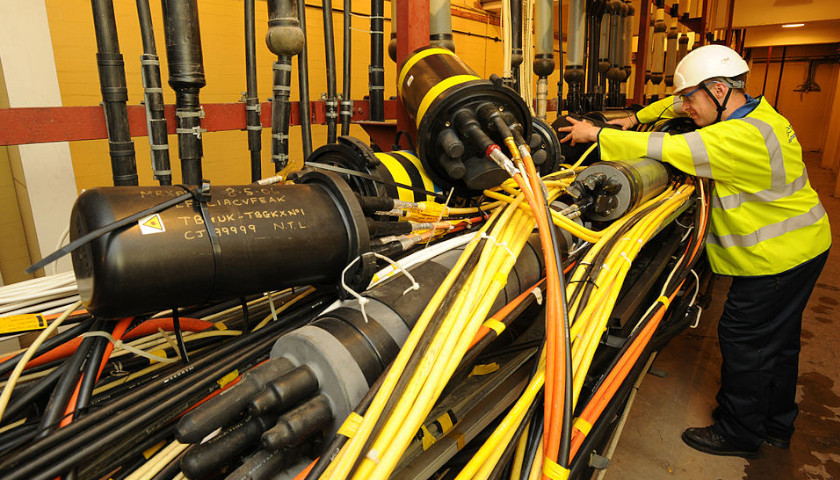by Deborah Collier
Lenoir City taxpayers have a chance to save themselves from an expensive and wasteful broadband network proposal, but they have to act soon. There is a Lenoir City Utilities Board (LCUB) hearing on February 22, 2022, to determine whether the LCUB should proceed with constructing its proposed broadband network in areas where high-speed broadband already exists.
Lenoir City does not lack broadband options. According to Broadband Now, more than 95 percent of consumers in Lenoir City are served by one of the 18 broadband providers in the area. At least two of these providers offer download speeds of 1 Gbps or more, and 8 to 10 offer residential services in the two zip codes serving the area. Despite having very few unserved residents, the LCUB is now proposing taxpayers take on significant debt in the form of a $110 million bond for its electric division to build a fiber smart grid, and another $22 million in the form of a loan from the electric division to the newly formed fiber division to help it build a new broadband network for a total of $132 million. This costly endeavor will build clearly unnecessary and duplicative fiber broadband service in the community.
Another disturbing aspect of this proposal is that six of the seven Lenoir City council members are also board members of the LCUB, which has issued this proposal. Approving this massive bond for a large project like this should be left to the voters, not to those who may have a vested interested in seeing the proposal adopted based on their personal biases stemming from participation in both bodies. It is critical that taxpayers, not the LCUB have the deciding vote on whether or not the project should proceed.
Federal funds have already been issued to several providers in Tennessee through grants and loans from the Federal Communications Commission’s (FCC) Rural Digital Opportunities Fund (RDOF), U.S. Department of Agriculture’s Rural Utilities Service (RUS), and the Appalachian Regional Commission, who are on track to reach unserved communities across the state. According to the Tennessee Department of Economic and Community Development, the state has received $94 million in federal funding for broadband investment since 2016. In addition, another $61 million from Tennessee portion of the Coronavirus Relief Fund has been dedicated to broadband, through the Tennessee Emergency Broadband Fund.
There is also $500 million that has been approved from Tennessee’s broadband grant program using money the state received through the American Rescue Plan Act. Communities and providers have until March 15, 2022, to apply for grants from this program. Instead of rushing a project like the one proposed by LCUB, it would be better if Lenoir City worked with area providers to access this grant funding to get broadband access to the very small number of people who are unserved in the community.
In addition, as part of the massive Infrastructure Investment and Jobs Act of 2021, Congress authorized a total of $65 billion for broadband initiatives, including $42.45 billion for the Broadband Equity, Access, and Deployment (BEAD) fund through the National Telecommunications and Information Administration (NTIA). An initial $100 million will be given to each state to help with planning efforts. Those states that submit a 5-year action plan to NTIA can receive additional funds based on a formula using the number of unserved and high-cost locations in the state based on the upcoming FCC maps that are slated to be released this year.
The Lenoir City Utilities Board plan, like other government-owned network proposals, was already inherently wasteful. But it makes even less sense considering that these projects are oversold to taxpayers, overbuild on top of existing and perfectly adequate private sector broadband networks. They fail to deliver on the promises made, leaving taxpayers with heavy debt in the form of bonds and loans.
Residents in Lenoir City should make their voices heard at the February 22, 2022, LCUB meeting to stop their money from being wasted on the utility board’s broadband plan. Instead, they should ask them, the mayor, and the city council members to leverage existing federal and state grant programs to ensure that unserved households in their community can get connected. Building a government-owned network in a community already served by so many different providers would be costly, wasteful, and unsuccessful.
– – –
Deborah Collier is the Vice President for Policy and Government Affairs, Citizens Against Government Waste Vice President for Policy and Government Affairs, Citizens Against Government Waste.
Photo “Broadband Installation” by btphotosbduk. CC BY 2.0.









It’s “nice” to have a choice between “Providers” of cable service.
I once went from Wednesday to Saturday without service from one provider,
Needless to say, I switched to the other one that was available.
Now I watch as my Electric provider runs a third cable for Internet/TV.
I don’t have cell phone service at home, adding a few “Repeaters” would sure help.
[…] Star had this Commentary recently on the proposal. This recent news article is also good […]
Sure wish that I had had a say in the decision of Cumberland Electric Membership Coop (CEMC) to run miles and miles of fiber to provide internet service within it service area. Service already available by direct connection or satellite service. Besides, I have to wonder how long it will be before this fiber service will be superseded by new technology. It appears to me that CEMC was looking for a way to expand operations and to spend money. Not what I want from my Coop. They used the virtual “learning” fiasco as a justification. Never let a crisis go to waste.
The question that needs to be asked is, which Board and Council members have a financial interest in moving this boondoggle forward. Is it them, their spouses, family members, friends?
It’s called crony capitalism for a reason. Whether from a local level or the federal level, it’s all the same.